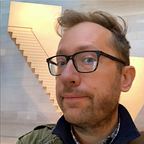Weirding The City
Can a deceptively simple slogan spark constructive conversation about the city we have and the city we want?
I like language and nuance. I like arguments in long form that take time to consider. I tend to offer my support to those who I get to know and trust over time.
So, it is uncharacteristic and even a bit uncomfortable for me to be launching a seemingly care-free experiment in all-caps sloganeering. Slogans tend to hide nuance. They are direct, assertive, and confrontational. They force you to take a side: agree or disagree; join or reject. Yet, this week I launched just such an experiment with MAKE DC WEIRD.
I love friends who have heard those three words and jumped in with enthusiasm and trust. “Heck yeah! I’m in! Let’s go!” they say.
I’m not that kind of person. I’ve thought about this phrase for a few years. It has stuck with me not because it is an easy bandwagon to jump on, but because it provokes so many questions. MAKE DC WEIRD is not so much a movement as it is a conversation starter.
Make
…is a verb. You are the implied subject. You are being urged to step up and work towards the completion of something. To participate in an act of creation.
DC
…is the name of our home. It is a vibrant, rapidly changing home with a rich cultural legacy and plenty of problems to address. It is also a home that is often mischaracterized as a dull place filled with bureaucrats and transients who have no stake in the future of our neighborhoods. If you’ve truly explored DC, you might be deeply hurt by that characterization. You and I know that DC has an unending depth of creativity and passion.
Weird
…is an adjective and a chameleon. Its definition can change depending on the viewer, depending on what you bring to it in terms of lived experience. Weird necessarily represents an alternative, an opposition to some thing that is not weird. But, you’ve got to define it for yourself, along with its opposite. In this case, weird is positioned as a positive, as something to work for. Perhaps a definition appropriate for this context is “those qualities that are proudly unique to DC,” but perhaps it also suggests “those things that are most endangered by ‘business as usual’” (which you must also define).
Putting it all together
String those three words together as MAKE DC WEIRD, and these are a few of the questions that come up:
- Who does the “making” in DC? Are there some people with less power to whom the making is imposed upon? And how can we call everyone to be involved in making DC into the inclusive city we want it to be?
- DC is a complex organism. It includes: residents and neighborhoods; politicians and the developers who fund them; institutions and their employees; built infrastructure and natural resources; diverse cultures and their national, global context. What does it mean for a city to be weird?
- DC is in the midst of tremendous change. To many long-time residents the city is unrecognizably weird already, and often not in a good way. While there may have been more crime in the past, the city may have also been more unique in the past. Do recent changes represent “weirdness” or homogeneity?
- With apologies to friends in Oregon and Texas, isn’t this idea of “weird” just another tired, played out, franchised sameness imported from white hipster culture in Portland and Austin? What does DC have in common with other so-called weird cities? Do we have shared values?
- There are all kinds of examples of incredible arts and culture in DC (some cited on makeDCweird.com). Why not say “Keep DC Weird” instead of MAKE DC WEIRD?
- Surely with all these questions, some other slogan would be better, less controversial, more topical? Surveys suggest crime and education are DC residents’ top concerns, not culture or “weirdness.” Might “Make DC Safe” or “Make DC Schools Great” be more important messages to put forward? What kind of change do we want to stand up for? What phrase would you rather stand behind?
And finally,
- I believe that the things that are “weird” (proudly unique and perhaps endangered) in DC contain and embody solutions to making our city all the things we want it to be: safe, equitable, livable, sustainable, smart, affordable, beautiful, joyful. How can we use art, culture, and everything else we consider “proudly unique” about DC as tools for constantly making the city we have a little closer to the city we want?
These are a few of the questions and ideas that come forward for me from these three words. Does this sound like a conversation worth having?
This is when I really hope you’ll jump up and say, “Heck yeah! I’m in! Let’s go!”
Pick it up
Make DC Weird is a conversation. I’d love your quick (or long and nuanced!) answer to any of these questions. Respond here on Medium (scroll down to start your own post), or use hashtag #makeDCweird on Twitter/Instagram.
AND if you think this is a conversation worth having, furthering, and spreading, jump to makeDCweird.com. I’m pledging at least 50% of sales (starting with a simple $2 MAKE DC WEIRD sticker) toward commissioning new works by DC artists who are engaged in this conversation.
